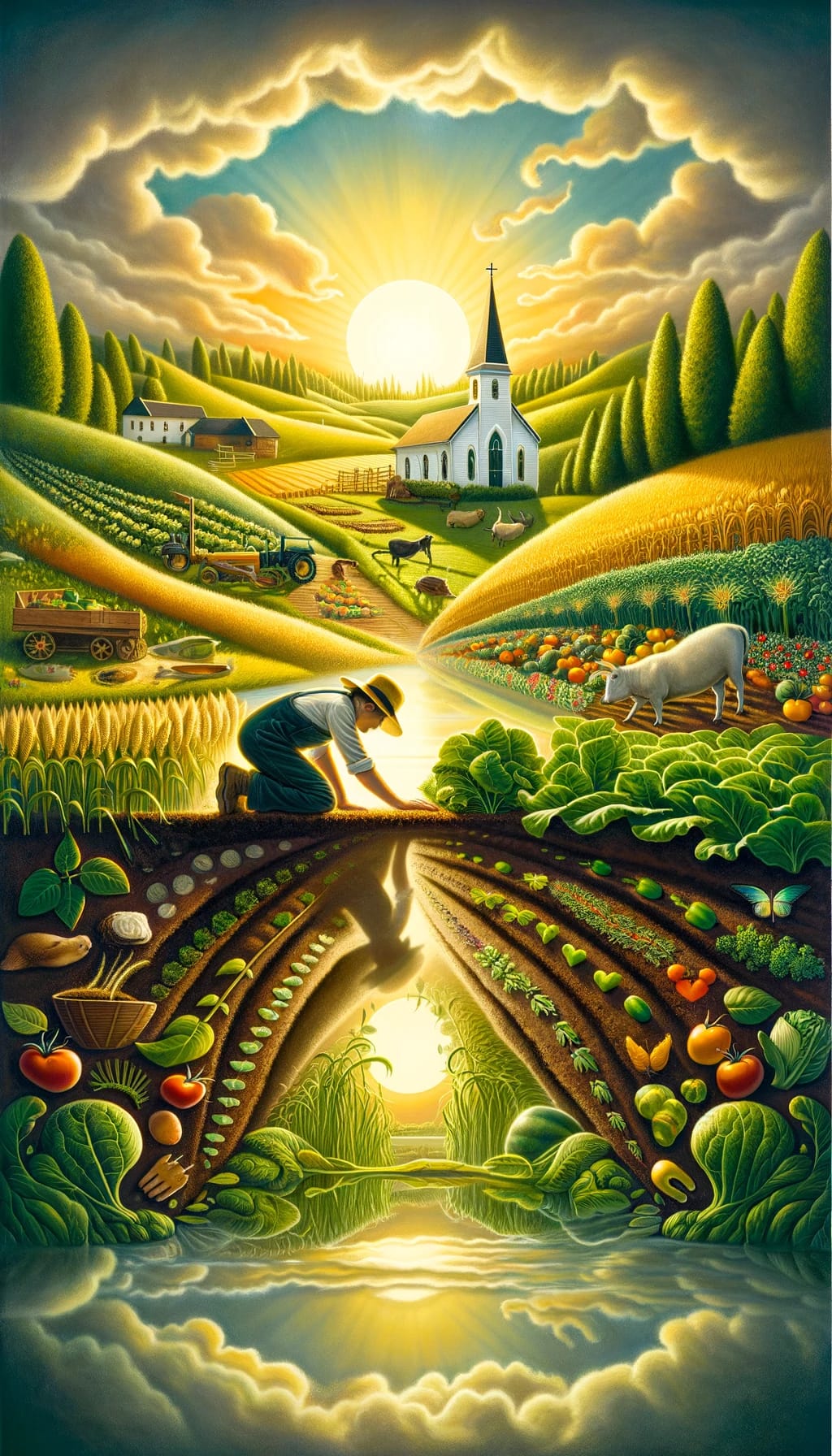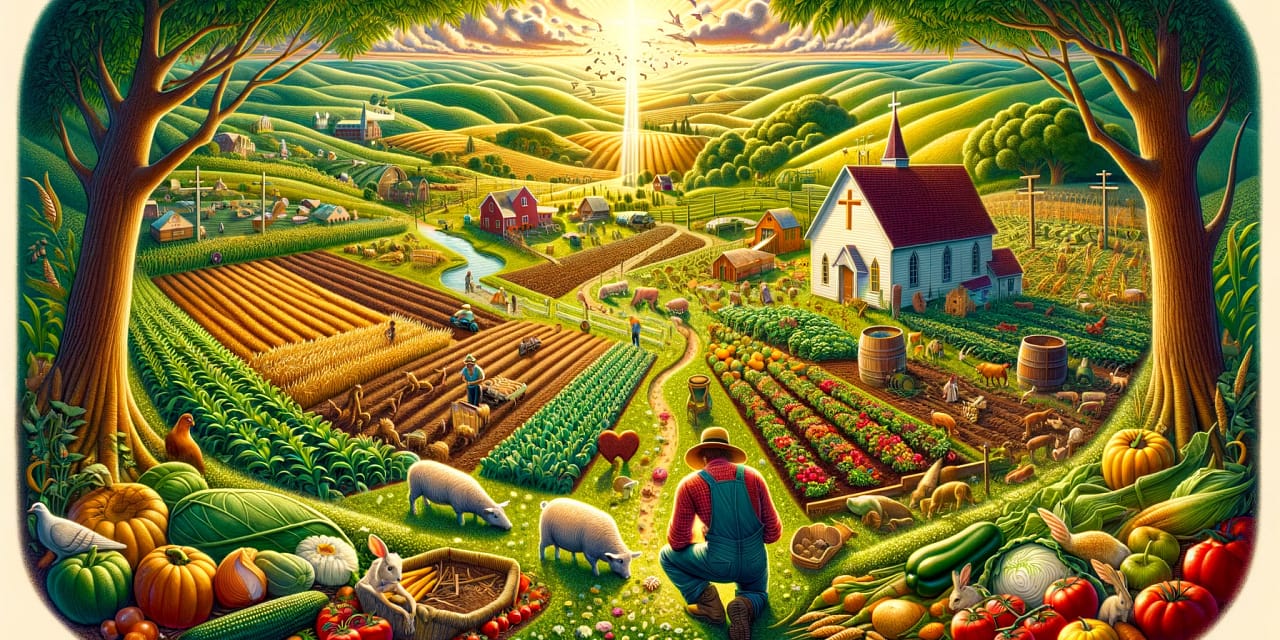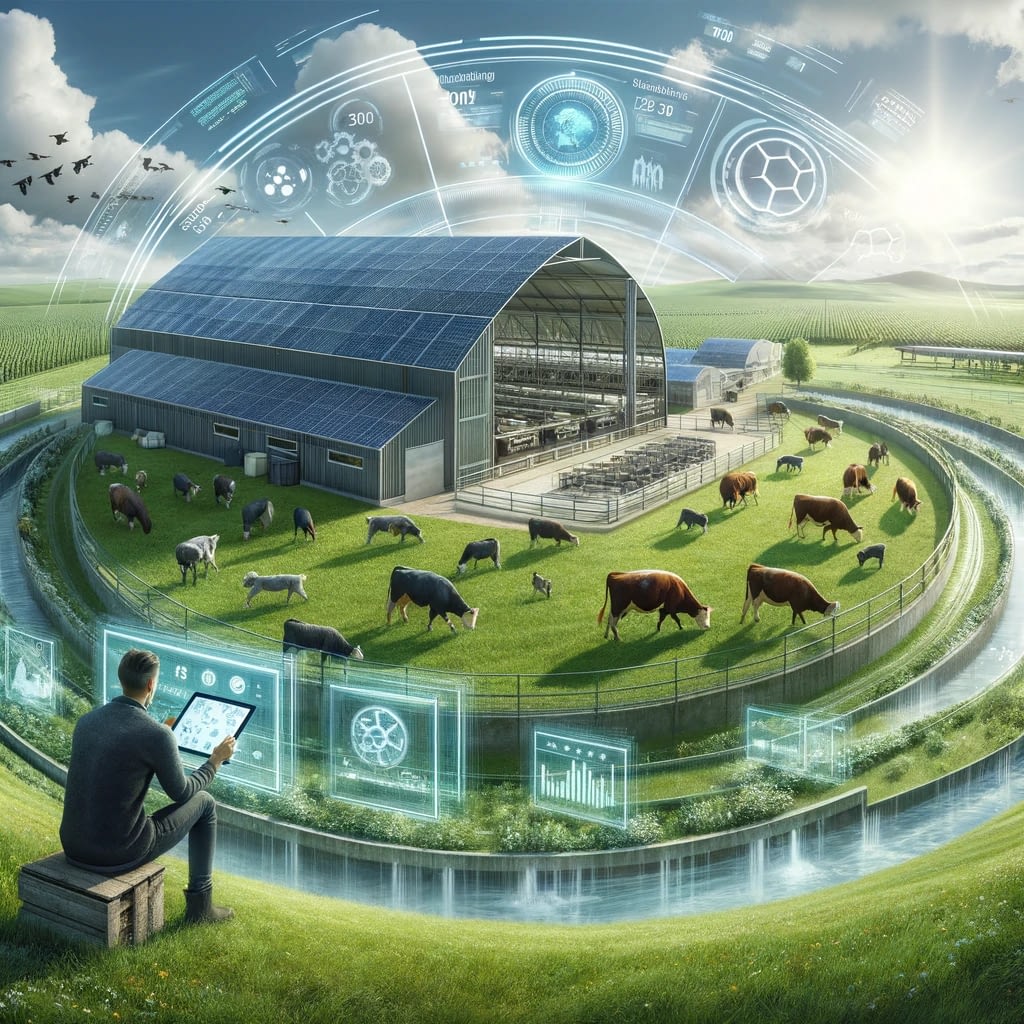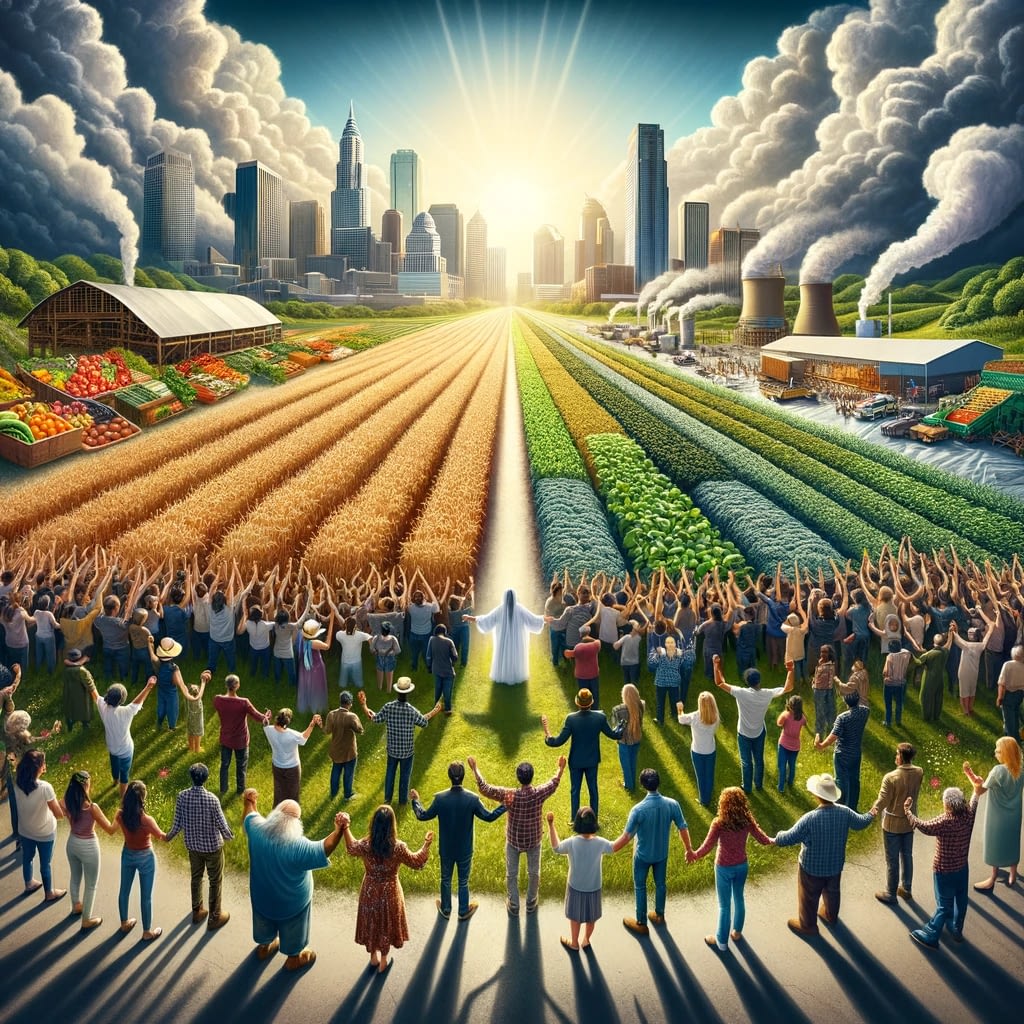This post may contain a affiliate links which means we may gain a percentage of your purchases at no cost to you. We only suggest products and services that we have used and we feel is a valuable resource. We may also from time write a sponosred post for brands that we love or feel they provide value and are worth buying and promoting. Please read our disclaimer for more info | Edited by By Pro Writing Aid. Pro Writing Aid is your little writing buddy that helps you become a better writer. You can check it out my affiliate link here.: PRO WRITING AID
Reflecting on Food, Faith, and Stewardship A Christian Perspective on Modern Agriculture
Theological Explorations Series.
Content Level
Excerpt
The documentary Food Inc. exposes the complexities and challenges of the modern food and agriculture manufacturing systems, highlighting the significant impact these systems have on society. It raises critical moral and ethical questions, among them the treatment of animals and the transparency of food production. Scripture provides clear guidance on these issues, advocating for a system that reflects divine stewardship rather than exploitation. Genesis 1:28 establishes humanity’s responsibility over God’s creation, extending to the compassionate treatment of animals, a sentiment found in Proverbs 12:10: ‘A righteous man cares for the needs of his animal, but the kindest acts of the wicked are cruel.
28 God blessed them; and God said to them, “Be fruitful and multiply, and fill the earth, and subdue it; and rule over the fish of the sea and over the birds of the sky and over every living thing that [a]moves on the earth (Genesis 1:28 NASB).”
10 A righteous person has regard for the life of his animal, But even the compassion of the wicked is cruel (Proverbs 12:10 NASB).
Reflecting on Food, Faith, and Stewardship | A Christian Perspective on Modern Agriculture
Image Source: Collaboration with Dall-E of God providing and caring for creation 2024
Ethical Dilemmas in Modern Agriculture
The documentary Food Inc. exposes the complexities and challenges of the modern food and agriculture manufacturing systems. It questions the moral and ethical implications of these systems on society, sparking a critical dialogue about the rights of animals, the transparency of food content, and equitable access to healthy nutrition.
Biblical Foundations of Stewardship and Compassion
Scripture provides clear guidance on the relationship between humans and the natural world. Genesis 1:28 establishes humanity’s dominion and stewardship over God’s creation, a responsibility that extends to compassionate treatment of animals as articulated in Proverbs 12:10 (The Holy Bible, NIV). These biblical principles challenge the practices observed in modern agriculture, advocating for a system that reflects divine stewardship rather than exploitation
The Plight of Animals and the Call for Ethical Treatment
Image Source: Collaboration with Dall-E farming of possible futures.
The documentary highlights the inhumane conditions under which many farm animals are raised, drawing attention to the disparity between current agricultural practices and the biblical call for compassionate stewardship. It underscores the need for systemic change, championed by organizations like the Humane Farming Association and Animal Welfare Approved, to ensure animals are treated with the dignity and respect they deserve.
Reflecting on Food, Faith, and Stewardship | A Christian Perspective on Modern Agriculture
Genetically Modified Organisms and the Right to Know
One who declares truth tells what is right, But a false witness, deceit. (Proverbs 12:17 NASB).
The issue of genetically modified organisms (GMOs) and the lack of transparency in labeling practices represent another ethical concern within the food industry. The correlation between the rise of GMOs and health issues like diabetes and obesity underscores the importance of informed consumer choices and the right to know what is in our food, aligning with the Christian ethic of stewardship over our bodies and the environment. Continued concerns about GMOs and potential health effects such as “Gluten Disorders” have been raised by the Institute for Responsible Technology (Institute for Responsible Technology).
Image Source: Collaboratio with Dall-E on ethical stewardship of the land for farming.
Reflecting on Food, Faith, and Stewardship | A Christian Perspective on Modern Agriculture
Image Source: Collaboratio with Dall-E on moving towards a toxin-free lifestyle Dall-E forgot to add a stove and oven-not a diet recommendation.
Detoxifying Our Bodies and Environment
Dr. Steven J. Genius emphasizes the importance of eliminating toxic metals from the human body, highlighting the impact of chemical exposure on health (Genuis). This perspective aligns with the need for a cleaner, more natural food system that minimizes exposure to harmful substances, reinforcing the biblical mandate for stewardship of our bodies and the earth.
Access to Healthy, Affordable Food: A Moral Imperative
The disparity in access to healthy food is starkly illustrated by contrasting experiences in two Californian cities: The Bay Area and Los Angeles. In the Bay Area, the community benefits from farm-to-table dining options and markets selling organic, locally-sourced produce. This reflects a commitment to sustainable and healthy eating practices, supported by a community that values environmental stewardship and mutual care.
Conversely, Los Angeles presents a contrasting scenario, with its prevalence of ‘food deserts’ where fresh, affordable food is hard to come by. The convenience of fast food often outshines the limited selections of healthy options, especially in low-income neighborhoods. This situation is further exacerbated by regulatory barriers; unlike in the Bay Area and Ventura County, Los Angeles County residents face restrictions on donating food from their backyards to food banks. Such limitations not only hinder community efforts to address food insecurity but also illustrate systemic inequalities that restrict access to nutritious food.
Conversely, Los Angeles presents a contrasting scenario, with its prevalence of ‘food deserts’ where fresh, affordable food is hard to come by. The convenience of fast food often outshines the limited selections of healthy options, especially in low-income neighborhoods. This situation is further exacerbated by regulatory barriers; unlike in the Bay Area and Ventura County, Los Angeles County residents face restrictions on donating food from their backyards to food banks. Such limitations not only hinder community efforts to address food insecurity but also illustrate systemic inequalities that restrict access to nutritious food.
Image Source: Collaboratio with Dall-E on highrise, rooftop garden.
The Role of Community and Faith in Promoting Sustainable Food Practices
The teachings of the Bible not only celebrate the abundance of God’s creation but also entrust us with the responsible stewardship of the earth and its resources. This divine mandate calls for a conscientious approach to food production and consumption, urging us to adopt gardening, support local farms, and engage in sustainable farming practices. Such actions empower communities to develop a food system that is equitable, nourishing, and sustainable, truly reflective of biblical values that prioritize care for the environment and the well-being of every individual.
The disparities in food access between regions like Sausalito and Los Angeles underscore the critical role of community and faith in bridging these gaps. While some areas benefit from the ability to share backyard harvests with those in need, others confront restrictions that limit such community-supported generosity. This situation underscores the importance of community action and faith-based advocacy in promoting policy changes and practices that enhance food equity.
Image Source: Collaboratio with Dall-E on moving towards a toxin free lifestyle
By supporting local farms committed to sustainable agriculture, communities can ensure a reliable source of healthy, ethically produced food. This support not only helps local economies but also reduces the environmental impact of food production, aligning with the stewardship responsibilities highlighted in Scripture. Additionally, by advocating for the right to donate food from backyard gardens across all regions, fostering community gardens, and patronizing local farmers’ markets, we act on the compassionate stewardship entrusted to us.
These collective efforts, inspired by faith, do more than just promote environmental responsibility and healthier lifestyles. They forge a path towards a more just world where the generosity of God’s creation is shared equitably, allowing all people, regardless of location or economic status, to partake in the dignity and joy of nourishing themselves and their families. In this way, the role of community and faith in promoting sustainable food practices becomes a powerful testament to our commitment to caring for our neighbors and the earth, ensuring a sustainable future for all.
Image Source: Collaboratio with Dall-E on connection between community and sustainable lifestyle
The Connection Between Community, Faith, and Sustainable Eating
The teachings of the Bible highlight God’s generous provision through nature and assign humans the role of careful caretakers of the earth. This responsibility involves managing the environment and its resources wisely to ensure that everyone can benefit, both now and in the future. By engaging in gardening and adopting sustainable farming methods, communities have the power to create a food system that is just, accessible to all, and enriching.
This approach is deeply rooted in biblical principles that call for respect for the earth and compassionate concern for the well-being of our fellow humans. Essentially, when we come together as a community to support sustainable food practices, we’re not just taking care of the planet—we’re also taking care of each other. This united effort reflects the core biblical values of stewardship and compassion, leading to a healthier, more equitable world where everyone has the opportunity to grow and enjoy their own food.
Image Source: Collaboratio with Dall-E call to Christians to take action to improve community and sustainable farming.
A Call to Action for Christians
Food Inc. challenges us to reflect on our role in the food system from a Christian perspective. It invites us to consider how we might better fulfill our mandate to care for God’s creation and each other. As stewards of the earth, we are called to make ethical choices that promote the health of our bodies, our communities, and the environment. The journey towards a more compassionate and sustainable food system is both a responsibility and an opportunity to live out our faith in meaningful ways.
Reflecting on Food, Faith, and Stewardship | A Christian Perspective on Modern Agriculture
Summary
The blog post provides a comprehensive exploration of the ethical and moral implications of modern agriculture from a Christian perspective, inspired by the documentary Food Inc. It delves into the treatment of animals, the use of genetically modified organisms (GMOs), and access to healthy food, contrasting current practices with biblical teachings on stewardship and compassion. The post underscores the importance of informed consumer choices, the right to know what is in our food, and the Christian call to act as stewards of God’s creation. Personal experiences highlight the disparities in access to nutritious food and the benefits of sustainable, ethical food production. The piece concludes with a call to action for Christians to engage in more ethical food practices, emphasizing the role of faith in promoting a just and sustainable food system. Through critical analysis, biblical integration, and personal reflection, the post aims to inform, engage, and inspire readers to consider their impact on the food system and the broader world.
Citations
The Holy Bible, New International Version. Zondervan, 2011.
Institute for Responsible Technology. “Gluten Disorders.” *Institute for Responsible Technology*, n.d., http://responsibletechnology.org/gmo-education/gluten-disorders/. Accessed 1 March 2024.
Genuis, Steven J. “Chemical Exposure and The Elimination of Toxic Metals from the Human Body.” *Seeking Health*, 13 April 2016, https://seekinghealth.org/wp-content/uploads/2016/04/Stephen%20Genuis%20-%202016%20Metal%20detox%203.0%20April%2013%202016_sjg%202.pdf. Accessed 1 March 2024.
BEFORE YOU CLICK TO THE NEXT ARTICLE, PLEASE LEAVE YOUR THOUGHTS BELOW
We invite you to scroll down and leave your mark in the comments section. Whether it’s a thought that sparked, a reaction that stirred, a suggestion for improvement, or an innovative idea you’re burning to share, your input is the key that unlocks our collective potential. Dive into the dialogue below and let your voice be heard.
#ShareYourInsightBelow
Reflecting on Food, Faith, and Stewardship | A Christian Perspective on Modern Agriculture






















